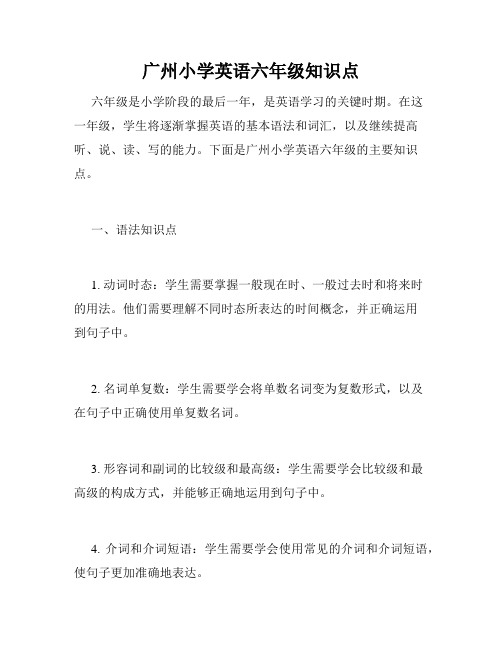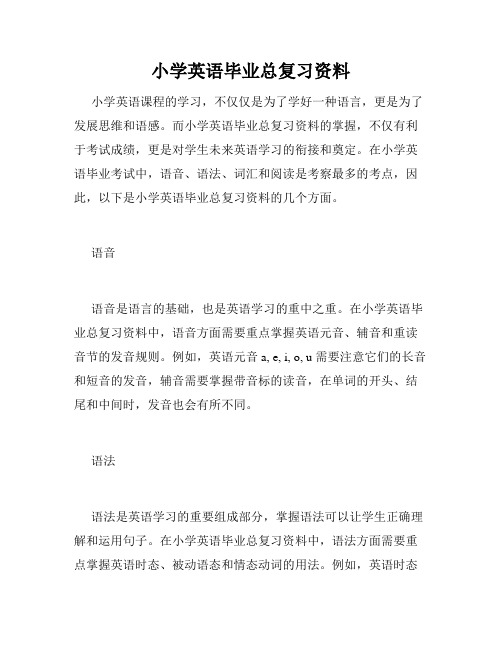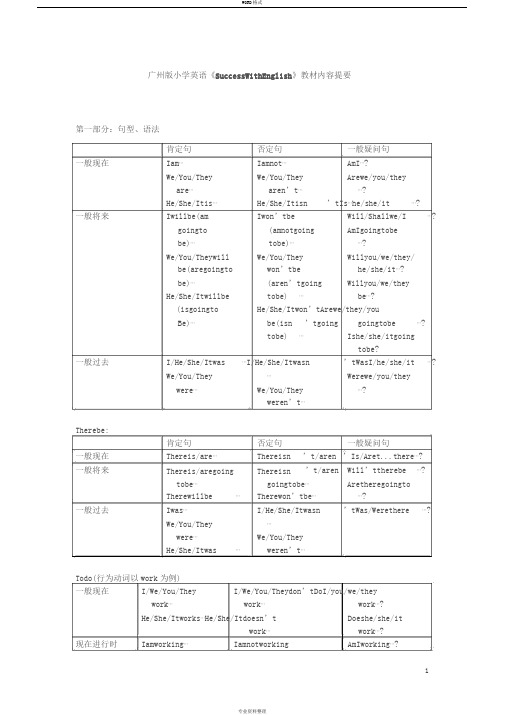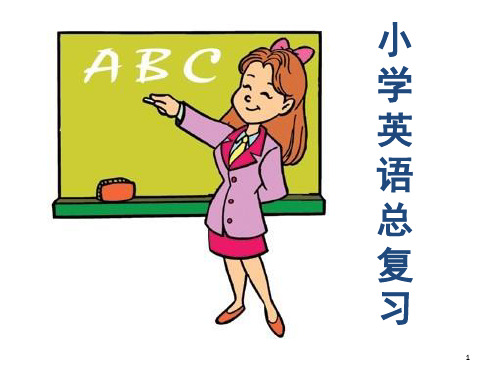广州版小学英语语法毕业总复习资料
广州小学英语六年级知识点

广州小学英语六年级知识点六年级是小学阶段的最后一年,是英语学习的关键时期。
在这一年级,学生将逐渐掌握英语的基本语法和词汇,以及继续提高听、说、读、写的能力。
下面是广州小学英语六年级的主要知识点。
一、语法知识点1. 动词时态:学生需要掌握一般现在时、一般过去时和将来时的用法。
他们需要理解不同时态所表达的时间概念,并正确运用到句子中。
2. 名词单复数:学生需要学会将单数名词变为复数形式,以及在句子中正确使用单复数名词。
3. 形容词和副词的比较级和最高级:学生需要学会比较级和最高级的构成方式,并能够正确地运用到句子中。
4. 介词和介词短语:学生需要学会使用常见的介词和介词短语,使句子更加准确地表达。
5. 基本句型:学生需要学会构造基本的英语句型,包括肯定句、否定句、疑问句等。
6. 从句的用法:学生需要学会理解和使用主从复合句,包括宾语从句、定语从句和状语从句等。
二、词汇知识点1. 常见的动词、形容词和副词:学生需要掌握基本的动词、形容词和副词,以丰富自己的词汇量。
2. 日常生活用词:学生需要熟悉和运用日常生活中常见的词汇,包括食物、衣物、家居用品等。
3. 学科课程用词:学生需要掌握与学科相关的词汇,包括数学、科学、地理等。
4. 动物和植物的名称:学生需要熟悉并记住常见的动物和植物的名称。
5. 人体部位和感觉词汇:学生需要学会使用描述人体部位和感觉的词汇,以便进行交流。
三、听力知识点1. 听懂日常用语:学生需要通过听力练习,逐渐提高对日常用语的理解能力。
2. 听懂简短对话和问题:学生需要通过听取简短对话和问题,理解并正确回答相关问题。
3. 听懂短文和故事:学生需要通过听取短文和故事,能够理解并记住主要内容,并回答相关问题。
四、阅读知识点1. 阅读理解:学生需要通过阅读短文,理解并回答相关问题。
他们需要掌握基本的阅读技巧,如寻找关键词、推测词义等。
2. 词汇理解:学生需要通过阅读,掌握理解生词的技巧,如通过上下文推测词义等。
小学英语毕业总复习资料

小学英语毕业总复习资料小学英语课程的学习,不仅仅是为了学好一种语言,更是为了发展思维和语感。
而小学英语毕业总复习资料的掌握,不仅有利于考试成绩,更是对学生未来英语学习的衔接和奠定。
在小学英语毕业考试中,语音、语法、词汇和阅读是考察最多的考点,因此,以下是小学英语毕业总复习资料的几个方面。
语音语音是语言的基础,也是英语学习的重中之重。
在小学英语毕业总复习资料中,语音方面需要重点掌握英语元音、辅音和重读音节的发音规则。
例如,英语元音 a, e, i, o, u 需要注意它们的长音和短音的发音,辅音需要掌握带音标的读音,在单词的开头、结尾和中间时,发音也会有所不同。
语法语法是英语学习的重要组成部分,掌握语法可以让学生正确理解和运用句子。
在小学英语毕业总复习资料中,语法方面需要重点掌握英语时态、被动语态和情态动词的用法。
例如,英语时态包括一般现在时、一般过去时、将来时等,需要掌握其用法及句型转换。
词汇词汇是语言的基本单位,也是英语学习的难点之一。
在小学英语毕业总复习资料中,词汇方面需要重点扩大词汇量,学习常用词汇和短语,并注意单词的词性和用法。
例如,掌握一些常见的动词、名词、形容词和副词,并学会用其构成句子。
阅读阅读是英语学习的重要环节,也是小学英语毕业考试的必考内容。
在小学英语毕业总复习资料中,阅读方面需要重点训练阅读理解能力和语言表达能力。
例如,阅读时需要理解文章的主旨和意图,然后根据文章内容填空、配对或判断。
总结小学英语毕业总复习资料的掌握是重要的,需要结合平时的学习,通过多种途径的练习,加强记忆能力和应用能力。
在学习过程中,还需要注意语音、语法、词汇和阅读等方面的重点。
小学英语毕业总复习资料的整理和总结,可以让学生更好地备战毕业考试,也为未来的英语学习打下良好的基础。
(完整)广州版五年级英语语法

小学英语五年级(上)复习摘要Module 1短语:go to work do some reading surf the Net go for a walk take exercise句型:1.Would (you)like to + 动词原形。
意为“想要做……”肯定回答为:Yes, I’d like to. 否定回答为:No, thank you.例子:Would you like to _____ (go)to school with Yongxian tomorrow, children?ually表示“经常,通常”,是一般现在时的标志性词语。
一般现在时的标志性词语还有sometimes, often.也就是说一般看到这些词语都要用一般现在时时态。
例子:I usually get up at 8 o’clock. She usually _____(go) to school by bus.3. -----What are these (those)? / What is this (that)?-----They are……/ It is……4.How often(多久,多长时间) How many/much(多少) How old(多大,对年龄进行提问)例子:How often do you watch TV? / How often_____(do) Li Hong watch TV?短语:on holiday Children’s Day Teachers’ Day next to…go shopping fall asleep句型:1.How many_____(term) are there in your school year? 你们一学年共有多少个学期?2. -----When does the autumn term start?-----It starts in_____ and ends in_____ (注意月份的首字母要大写)Wh开头的疑问词:where who what which whose why介词:用at/on/in填空_____8 o’clock _____summer _____the weekend _____weekdays _____holiday _____September_____ the first day _____Monday _____January 1st_____London单元语法:一般现在时的构成:第三人称单数要在词尾加-s/-es1.一般情况下加-s 例:eat-eats, work-works2.在s, sh, ch, o 后面加-es 例:dress-dresses, wash-washes, teach-_____ go-_____3.以“辅音字母+y”结尾的动词,先变Y为i再加-es 例:carry-carries, fly-_____一般现在时变为否定式:当动词为实义动词时:在动词前加上don’t或doesn’t当动词为be动词时:直接在be动词后面加 not一般现在时变为疑问式:当动词为实义动词时:用do或does来提问当动词为be动词时:用am/are/is 来提问例子:I/You work here. I/You don’t work here. Do I/you work here?练习:He/She works here例子:I am a student. I am not a student. Am I a student?练习:We are students.Module 2短语:faster than…stand by…both of …句型:I can jump and I can swim.(can为情态动词,否定式是can not, 缩写为can’t)当疑问句中用can来提问时,肯定回答为yes, I can否定回答为No, I _____ 例句:----Can you sing? ----yes, _____./ No, _____翻译:我不会游泳,但我可以飞的非常高。
必须打印)广州版小学英语四年级下册复习要点及练习

Module 1 A g e一、询问他人名字和年龄:1.询问对方名字:- What’s your name? - My name is _____.2.询问他人名字:- What’s that boy’s name? - His/Her/Its name is _____.3.询问对方年龄:- How old are you? - I am _____ years old.4.询问他人年龄:- How old is he/she/it/that girl? - He/She/It is (about) _____ years old.二、现在进行时——表示说话当时正在发生的事情或动作。
时态结构:主语(人称/人物/动植物/物品)+ am/is/are + 动词-ing形式(现在分词)例如:I am coming. / He is running. / She is sleeping. / We are playing chess.重点1:am/is/are 的选用要与前面的主语人称一致。
重点2:动词-ing形式(现在分词)的变型要拼写正确。
★动词-ing变化规律三、描写一个人的外貌特征:He/She/It looks young/beautiful/strong/tall/slim.They look (so) cute.四、祝贺生日用语:Happy Birthday!回答:Thank you!送礼物用语:Here is your birthday present from me/your father.回答:Thank you!五、动词ing的基本变化规则(1)直接加ing,如do—doing, paint—painting(2)去e再加ing,如have—having, come—coming give—giving, drive—driving, make—making close—closing, use—using(3)双写最后一个辅音字母,再加ing,如:shop—shopping, skip—skipping, sit—sitting run—running, put—putting, get—getting swim—swimming, forget—forgettingModule 2 Activities一.询问他人正在做什么事:回答用正在进行时问:What are you doing? What is he/she doing? What are they doing?答:I am listening to the music. He/She is playing guitar. They are playing basketball.复习现在进行时的时态,结构:am/are/is+动词ing。
广州版小学英语六年级上册复习归纳1

广州版小学英语《SuccessWithEnglish》教材内容提要第一部分:句型、语法肯定句否定句一般疑问句一般现在Iam⋯Iamnot⋯AmI⋯?We/You/They We/You/They Arewe/you/theyare⋯aren’t⋯⋯?He/She/Itis⋯He/She/Itisn ’tIs⋯he/she/it ⋯?一般将来Iwillbe(am Iwon’tbe Will/Shallwe/I ⋯?goingto (amnotgoing AmIgoingtobebe)⋯tobe)⋯⋯?We/You/Theywill We/You/They Willyou/we/they/be(aregoingto won’tbe he/she/it⋯?be)⋯(aren’tgoing Willyou/we/theyHe/She/Itwillbe tobe) ⋯be⋯?(isgoingto He/She/Itwon’t Arewe/they/youBe)⋯be(isn ’tgoing goingtobe ⋯?tobe) ⋯Ishe/she/itgoingtobe?一般过去I/He/She/Itwas ⋯I/He/She/Itwasn ’t WasI/he/she/it ⋯?We/You/They ⋯Werewe/you/theywere⋯We/You/They ⋯?weren’t⋯Therebe:肯定句否定句一般疑问句一般现在Thereis/are⋯Thereisn ’t/aren ’Is/Aret...there⋯?一般将来Thereis/aregoing Thereisn ’t/aren Will’t therebe ⋯?tobe⋯goingtobe⋯AretheregoingtoTherewillbe ⋯Therewon’tbe⋯⋯?一般过去Iwas⋯I/He/She/Itwasn ’t Was/Werethere⋯?We/You/They ⋯were⋯We/You/TheyHe/She/Itwas ⋯weren’t⋯Todo(行为动词以work为例)一般现在I/We/You/TheyI/We/You/Theydon’t DoI/you/we/theywork⋯work⋯work⋯?He/She/Itworks⋯He/She/Itdoesn’t Doeshe/she/itwork⋯work⋯?现在进行时Iamworking⋯Iamnotworking AmIworking⋯?1We/You/Theyare ⋯Areyou/we/theyworking⋯We/You/Theyaren’t working⋯?He/She/Itis working⋯Ishe/she/itWorking⋯He/She/Itisn ’t working⋯?working⋯一般将来I/We/You/He/She/It I/We/You/He/She/It/They WillI/we/you//Theywillwork won’twork ⋯they/he/she/it⋯I’mnotgoingtowork ⋯work⋯?I’mgoingtowork We/You/Theyaren’t AmIgoingto⋯goingtowork ⋯work⋯?We/You/Theyare He/She/Itisn ’tgoingtoAreyou/we/theygoingtowork ⋯work⋯goingtoworkHe/She/Itisgoing ⋯?towork⋯Ishe/shegoingtowork⋯?一般过去I/We/You/They/He/ I/We/You/They/He/ DidI/we/you/they/She/Itworked ⋯She/Itdidn ’twork ⋯/he/she/itwork⋯?1.读下面的特殊疑问式的句子,你能总结一些特殊疑问句的构成的规律吗?I.Wholivesthere.Whoissingingintheroom?Whowasathomeyesterday?II.Whatdoeshedo?Whatishedoing?Whatdidtheydo?Whendoesheusuallygetup?Whendidshehavedinneryesterday?Whereishenow?Wherearetheyplantingtrees?Wheredidtheyplayfootball?Howisyourmother?Howishecoming?Howdidtheygetthere?Whydoeshegothere?Whydidshegothere?III.Whosebookisthis?Whoseparentsarecominghere?Whichbookisyours?Whichpresentsdidhegiveyou?22.关于形容词、副词的比较级和最高级(1)你知道形容词、副词的比较级和最高级构成的一些规律吗?A.一般情况下加-er,-est:long–longer,longest;small–smaller,smallestB.重读闭音节,双写最后一个字母再加-er,-est:big–bigger,biggest; hot–hotter,hottestC.辅音字母加y,改作后一个字母y为i再加-er,-est:funny–funnier,funniest, lucky–luckier,luckiestD.部分双音节和多音节词,加more,most:slowly–moreslowly,mostslowly; moredelicious,mostdeliciousE.不规则变化:good–better,best; bad–worse,worst(2)你知道形容词、副词的比较级和最高级句子的构成吗?A.Thisbookisnewerthanthatone.TheEnglishbookisthenewestofthethree.MikerunsfasterthanJohn.Mikerunsfastestinhisclass.B.Thisflowerismorebeautifulthanthatone.Thistreeistheoldestinthepark.Thegirlisswimmingbetterthanthegirl.Jimswimsbestinhisgroup.C.Snakesaremoredangerousthanfrogs.Themeetingisthemostimportant.Theoldmanwalksmoreslowlytheyoungman.Katejumpshighestinherclass.D.TimhasmorebooksthanJim.Timhasthemoststampsinhisclass.3.关于代词some-,any-,no-,every-:(1)some-多用在肯定句表示请求得到某些东西的句子:Someonewillcomehere.Wouldyoulikesomethingtoeat.(2)any-多用于疑问句或否定句:Isthereanythinginthebox?Wedon’twanttoseeanyoneofthem?(3)no-是事实的否定:Thereisnothingintheroom.Nobodycandothat.(4)代词some-,any-,no-,every-语法上看成是第三人称单数:Thereissomethinginthebottle.Everyonelikesit.3表1:小学教材各话题板块涉及的主要内容话题板主要涉主要涉及单词快及模块数字、B1M6 基数、序数、星期、数量、B3M5-6 日期、月份、季节、时间、B5M1 年份、钟点的表达、日期计量单位等购物B3M1 money,change,shopB4M4 assistant,vendor人物:年B1M2 表男女老少的类别龄、体貌B2M3 名、身体部位名、服衣着、性B3M1-4 饰名、体质与外貌形格、职业、B4M1-2 容词、性格形容词、爱好与特B5M2 职业、表特长爱好的长、理想、B8M3 动词生平B8M5学校生B4M3 科目名、作息动词、活:课B5M1 运动、娱乐动词程、作B6M1息、课B6M3外活动家庭生B2M1 家庭成员名、职业名、活:家B3M6 爱好特长动词、娱乐庭成员B4M4 形式名词及动词、家及其职B5M1 务动词、频度副词业与爱好、家务与休闲食品B4M4 食品名、三餐名、进B6M5 食动词生活习B6M2 描述体质的形容词、惯与健B6M5 描述身体感觉的形容康词、生活习惯的动词、主要涉及语法、功能等名词复数;Howmany/Howheavy/Howlong/Whattime/When 等引导的疑问句和回答等;时间、星期、日期的询问与表达;招呼与应答;表达要买某种商品或询问是否有某种商品;对商品的评论;询问价格;询问是否还需其他商品及应答;找零描述体质外貌的各种句式:be+adj,has/have+n,with+n,in+n 的用法表示爱好与特长的句式: likesth/doingsth,begood/badat⋯,do(es)⋯well;描述爱好与行为习惯等的一般现在时:Hereadsalot.HewatchesTVveryoften等;表示职业、愿望的句式:be+jobs;Iwanttobea⋯whenIgrowup.IhopeIcan⋯叙述生平的句式:beborn⋯一般现在时的各种句式一般现在时的各种句式;询问与表达频度;谈论对娱乐节目的爱好;评论娱乐节目三餐时间;谈论饮食习惯;对饮食的偏好与评论;待客用语及应答描述身体感觉和状况看病用语情态动词 should的用法祈使句4(电B7M3-4话)邀约与聚会动物、B1M2 植物B2M2B5M2-3B5M5B6M4 天气与B6M1 季节B6M6节假B1M5 日、旅B5M4行、城B7M1-2市、计B7M6划与建B7M3-4议地点、B2M4-6方位与B5M6 方向变化:B6M3 人的变B8M1 化、地方的变化过去的B7M5事情B8M2-4邀请与应答电话用语商量聚/约会时间、地点、交通方式等动植物名、动物行为描述动物外貌和习性的一般现在时方式动词、公园行为祈使句动词、描述动作的副规则的表达(can,need,must,mustn’t)词天气形容词、气象名询问与描述天气词、季节性娱乐和体比较天气育活动动词谈论对季节的偏好节假日名、交通方式询问计划和称述计划名、国家与城市名、各种提建议的句式描述城市的形容词、描述和比较城市休闲娱乐动词描述传统节日房间名、家具名、场描述位置关系所名、学校场室名、问路和指路方位介词、描述场室描述场室的形容词动词的过去式描述体貌性格、职业身份、行为习惯、能力、场所处室、天气等各种变化动词的过去式讲述过去的事情故事中的词组描述人物的生平讲述故事表2:小学教材话题分配Module Book1Book2Book3Book4Book5Book6Book7Book81 GreetingsRelationships Clothes Age Routines OurLifePlansChanges√/Shopping √And√√√√Dates√2 MyBody Animals People Activities AbilitiesSeeing aCitiesDiaries√√√/Hobbies√√Doctor√√√3 StationeryNationalitiesOccupations Sports Plants Our an Famous√√√School Invitation People √√and Our5Class √4 Colours MyRoom PeopleWho Entertainment TravelWildOnthe Stories √ HelpUs √√ Animals telephon e and√√Fables√√5 Transport MyHouseTime Foodand Zoo Eating ThePast Hopes√ √ √ Drink Animals Habits √and √ √Fantasi es √ √6 Numbers MySchool DaysOfThe Shoppin g Directio ns Weather Festivals andShapes √ Week √ √ √ √√ √表3:小学教材动词分类日常作息:wakeupgetupgetdressedwashtheface brush theteeth have breakfastgo to school goto workhave lessons havelunchtakearest play sport s takeexercises go(back)homehavedinnerdohomework haveabathgotobedsleepeatdrinkcook娱乐休闲:haveapartyhaveapicnic dosomereading doshoppinggoshopping goboatinggoswimming gosightseein ggofishinggotravelinggoonarivercruise gotothecircus goto theflower show goto th e cinema gotoa footbal l matchwatch afootball matchonTVcome to tea seea filmwatch thebirds listen to music / theradiowatch TV climbthemountain playcards e-mailafriendwritealettervisitafriend/Beijingmeetafriend爱好与特长: singdrawpaintplaythepiano/theguitar dowellin ⋯makeashipmodelplaycardsplaychess体育运动: runswimskiprope swim play basketball playfootball playtabletennisplaytennisplaybadmintondoweight-lifting家务:watertheflowersdogardeningplanttrees/flowerscleanthehousesweepthefloor washthedishes cook washthecar washclothes feedthepet学习:read listen speak write study learn practice hand inthehomework borrowabook returnabook catchupwithteach markthehomework preparethelessons tellastory6心理和情感活动:want love enjoy like dislike love prefer hope wish agreewith think dream feelsad/happy/excited/boredworry身体健康:takeexercise seeadoctorhaveacold/fever/toothache/headacheeat drink takethemedicine goonadiet feeltired/hot/cold/ill/sick感官动词:listento hear lookat see watchfeelhot/cold/tired soundinteresting/different/greatlookyoung/tall/beautiful/fresh/good种植活动:grow/plantatree grow/plantflowers watertheflowers digahole fillintheearth pickupthefruit appear位置移动:leave leavefor startfor move bring take climb run walk swim jump fly sitdown standup throw⋯at⋯travel go comegetto⋯getoutof⋯getdown fall fallover与职业有关的动词:work putoutfires cleanupeverythingdeliverletterscatchcriminals servefoodanddrinks helpinashopdriveataxi/anambulance checkyourteeth helpustolearnhelpsickpeople与“说”有关的动词:say speak talk tell与“看”有关的动作:look lookat lookfor watch see其它动词:last begin start end finish bite blow blow outbuy call carry catch change check close open countcostcover crash cut decorate free changegive grow /grow uphelpinvite getwet kill keep look for make need put onputout show turn waitfor runinto crashinto weighhavehavearest haveabath haveacold haveagoodtime havebeento⋯havealook havefun havetotaketakeamessage takearest takemedicine takeexercise takephotos takeabus takemetotheflowershow takethethirdleft I’lltakeit.WORD格式playplay computergames play cards playbasketball playmusicalinstruments playthepiano7专业资料整理。
广州版小学英语总复习(课堂PPT)

总称: food 、 fruit
其它: rain 、wind、snow、light 、 grass、money、paper 、pizza、 pasta 、salad 、 bread 、toast、 porridge、 rice、chocolate、icecream 、 broccoli
4
二. 名词复数形式: 1. +s 2. o(有生命), 以x, s, sh, ch 结尾+es 3. 辅音加y结尾,改y为i+es 4. 以fe或f结尾,改fe 或f 为v+es
(三)修饰比较级的词: much∕ a little∕a lot + 比较级
14
(四)表示 “越来越…” bigger and bigger 、happier and happier 、 more and more、less and lees 、more and more slowly 、 more and more beautiful 、
15
(六)部分双音节形容词、副词的比较级 与最高级:
• slowly—more slowly—most slowly • crowded—more crowded—most crowded • famous —more famous—most famous • quickly—more quickly —most quickly • patient—more patient —most patient • excited—more excited—most excited • boring—more boring —most boring
5
5. 单复数同形:fish 、sheep 、deer、 people 、Chinese、Japanese、 family(作为“家人”)
广州版英语四年级下学期全册知识点归纳

Unit 1: Places- Vocabulary: bank, hospital, library, post office, supermarket- Sentence patterns: Where is the _____? It’s near the_____.- Grammar: Prepositions of place (on, in, near, next to)Unit 2: Activities- Vocabulary: draw, read, swim, write, play- Sentence patterns: What do you want to do? I want to _____.- Grammar: Verbs of activities in the present tenseUnit 3: Healthy Lifestyle- Vocabulary: breakfast, lunch, dinner, fruit, vegetables- Sentence patterns: What do you have for _____? I have_____ for _____.- Grammar: Count and non-count nounsUnit 4: Seasons and Weather- Vocabulary: spring, summer, autumn, winter, sunny, rainy, cloudy, windy- Sentence patterns: What’s the weather like today? It’s_____.- Grammar: Adjectives to describe seasons and weatherUnit 5: Sports- Vocabulary: basketball, football, swimming, running- Sentence patterns: Do you like _____? Yes, I do. / No, I don’t.- Grammar: Verbs to express likes and dislikesUnit 6: Daily Routines- Vocabulary: get up, have breakfast, go to school, have lunch, go home, go to bed- Grammar: Present simple tense for daily routinesUnit 7: Food and Drinks- Vocabulary: noodles, rice, bread, milk, juice- Sentence patterns: What would you like to eat/drink? I would like some _____.- Grammar: Countable and non-countable nouns for food and drinksUnit 8: Clothes- Vocabulary: hat, coat, shirt, dress, trousers- Sentence patterns: What are you wearing? I’m wearing a _____.- Grammar: Articles (a, an, the)Unit 9: My Family- Vocabulary: father, mother, brother, sister, grandparents- Sentence patterns: How many _____ do you have? I have_____.- Grammar: Plural form of nounsUnit 10: My School- Sentence patterns: What’s in the _____? There is a _____.- Grammar: There is / There areUnit 11: My Hobbies- Vocabulary: dancing, singing, painting, playing chess, playing the piano- Sentence patterns: What do you like doing? I like _____.- Grammar: Verbs ending in -ingUnit 12: Animals- Vocabulary: lion, elephant, rabbit, monkey, panda- Sentence patterns: Have you ever seen a _____? Yes, I have. / No, I haven’t.- Grammar: Present perfect tense for experiencesUnit 13: Festivals- Vocabulary: Spring Festival, Lantern Festival, Dragon Boat Festival, Mid-Autumn Festival, Christmas- Sentence patterns: How do you celebrate _____? We _____.- Grammar: Simple past tense for activities in the past- Vocabulary: park, museum, theater, shop, zoo- Sentence patterns: What can you do in the _____? We can_____.- Grammar: Modal verbs (can, could)Unit 15: Transportation- Vocabulary: bus, taxi, subway, train, bike- Sentence patterns: How do you get to _____? I _____.- Grammar: Verbs of transportation (take, ride)以上是广州版英语四年级下学期全册的知识点归纳,包括词汇、句型和语法。
2022-2023年最新广州版英语四年级上册期末复习资料

2022-2023年最新广州版英语四年级上册期末复习资料Unit 1: Greetings and Introduction- Basic greetings: Hello, Hi, Good morning, Good afternoon, Good evening, Goodbye.- Introduce oneself: My name is [name]. Nice to meet you.- Ask and answer questions about names, ages, and nationalities.Unit 2: Numbers and Colors- Count and recognize numbers from 1 to 100.- Identify and name basic colors: red, blue, yellow, green, orange, purple, pink, brown, black, white.Unit 3: Family and Relationships- Learn vocabulary related to family members: father, mother, brother, sister, grandfather, grandmother.- Describe family relationships using possessive pronouns: my, your, his, her.Unit 4: School Life- Classroom objects: desk, chair, book, pencil, eraser.- Express likes and dislikes: I like/dislike [object/activity].Unit 5: Food and Drinks- Names of vegetables and fruits: carrot, tomato, potato, apple, banana, orange, etc.- Express hunger and thirst: I'm hungry/thirsty.Unit 6: Weather and Seasons- Learn vocabulary related to weather conditions: sunny, cloudy, rainy, windy.- Recognize and name the four seasons: spring, summer, autumn, winter.Unit 7: Daily Activities- Express daily routines: wake up, brush teeth, take a shower, eat breakfast, etc.- Ask and answer questions about daily activities using simple present tense.Unit 8: Animals and Pets- Learn vocabulary related to animals: cat, dog, rabbit, bird, fish, etc.- Express preference for certain animals: I like dogs/cats/birds.Unit 9: Hobbies and Leisure Activities- Vocabulary related to hobbies: draw, sing, dance, play basketball, swim, etc.- Express likes and dislikes for activities: I like/dislike swimming.Unit 10: Occupations and Jobs- Learn vocabulary related to occupations: doctor, teacher, firefighter, police officer, etc.- Ask and answer questions about people's professions.以上是2022-2023年最新广州版英语四年级上册期末复习资料的内容。
- 1、下载文档前请自行甄别文档内容的完整性,平台不提供额外的编辑、内容补充、找答案等附加服务。
- 2、"仅部分预览"的文档,不可在线预览部分如存在完整性等问题,可反馈申请退款(可完整预览的文档不适用该条件!)。
- 3、如文档侵犯您的权益,请联系客服反馈,我们会尽快为您处理(人工客服工作时间:9:00-18:30)。
,. 一、名词复数规则
1.一般情况下,直接加-s,如:book-books, bag-bags, cat-cats, bed-beds 2.以s. x. sh. ch结尾,加-es,如:bus-buses, box-boxes, brush-brushes, watch-watches 3.以“辅音字母+y”结尾,变y为i, 再加-es,如:family-families, strawberry-strawberries 4.以“f或fe”结尾,变f或fe为v, 再加-es,如:knife-knives 5.不规则名词复数: man-men, woman-women, policeman-policemen, policewoman-policewomen, mouse-mice child-children foot-feet,.tooth-teeth fish-fish, people-people, Chinese-Chinese, Japanese-Japanese 写出下列各词的复数 I _________him _________this ___________her ______ watch _______child _______photo ________diary ______ day________ foot________ book_______ dress ________ tooth_______ sheep ______box_______ strawberry _____ thief _______yo-yo ______ peach______ sandwich ______ man______ woman_______ paper_______ juice___________ water________ milk________ rice__________ tea__________
二、一般现在时 一般现在时基本用法介绍 【No. 1】一般现在时的功能 1.表示事物或人物的特征、状态。如:The sky is blue.天空是蓝色的。 2.表示经常性或习惯性的动作。如:I get up at six every day.我每天六点起床。 3.表示客观现实。如:The earth goes around the sun.地球绕着太阳转。 一般现在时的构成 ,. 1. be动词:主语+be(am,is,are)+其它。
如: I am a boy.我是一个男孩。 2. 行为动词:主语+行为动词(+其它)。如: We study English.我们学习英语。 当主语为第三人称单数(he, she,it)时,要在动词后加"-s"或"-es"。 如:Mary likes Chinese.玛丽喜欢汉语。
一般现在时的变化 1. be动词的变化。 否定句:主语+ be + not +其它。 如:He is not a worker.他不是工人。 一般疑问句:Be +主语+其它。 如:-Are you a student? -Yes. I am. / No, I'm not. 特殊疑问句:疑问词+一般疑问句。如:Where is my bike? 2. 行为动词的变化。 否定句:主语+ don't( doesn't ) +动词原形(+其它)。如: I don't like bread. 当主语为第三人称单数时,要用doesn't构成否定句。如: He doesn't often play. 一般疑问句:Do( Does ) +主语+动词原形+其它。 如: - Do you often play football? - Yes, I do. / No, I don't. 当主语为第三人称单数时,要用does构成一般疑问句。 如: - Does she go to work by bike? - Yes, she does. / No, she doesn't. 特殊疑问句:疑问词+一般疑问句。 如:How does your father go to work?
动词+s的变化规则 1.一般情况下,直接加-s,如:cook-cooks, milk-milks ,. 2.以s. x. sh. ch. o结尾,加-es,如:guess-guesses, wash-washes, watch-watches,
go-goes 3.以“辅音字母+y”结尾,变y为i, 再加-es,如:study-studies
一般现在时用法专练: 一、 写出下列动词的第三人称单数 drink ________ go _______ stay ________ make ________ look _________ have_______ pass_______ carry ____ come________ watch______ plant_______ fly ________ study_______ brush________ do_________ teach_______ 二、 用括号内动词的适当形式填空。 1. He often ________(have) dinner at home. 2. Daniel and Tommy _______(be) in Class One. 3. We _______(not watch) TV on Monday. 4. Nick _______(not go) to the zoo on Sunday. 5. ______ they ________(like) the World Cup? 6. What _______they often _______(do) on Saturdays? 7. _______ your parents _______(read) newspapers every day? 8. The girl _______(teach) us English on Sundays. 9. She and I ________(take) a walk together every evening. 10. There ________(be) some water in the bottle. 11. Mike _______(like) cooking. 12. They _______(have) the same hobby. 13. My aunt _______(look) after her baby carefully. ,. 14. You always _______(do) your homework well.
15. I _______(be) ill. I’m staying in bed. 16. She _______(go) to school from Monday to Friday. 17. Liu Tao _______(do) not like PE. 18. The child often _______(watch) TV in the evening. 19. Su Hai and Su Yang _______(have) eight lessons this term. 20. -What day _______(be) it today? - It’s Saturday. 三、按照要求改写句子 1. Daniel watches TV every evening.(改为否定句) ___________________________________________________ 2. I do my homework every day.(改为一般疑问句,作否定回答) ________________________________________________________
一、写出下列动词的第三人称单数 read________ have_________ sing ________ dance_________ put_________ see________ buy _________ love____________ live_______ take_________ come ________ get_________ stop_________ sit ________ begin________ shop___________ 二、用所给的动词的正确形式填空: 1.The boy __________________ ( draw)a picture now. 2.Listen .Some girls _______________ ( sing)in the classroom . 3.My mother _________________ ( cook )some nice food now. 4.What _____ you ______ ( do ) now? 5.Look . They _______________( have) an English lesson . 6.They ____________(not ,water) the flowers now. ,. 7.Look! the girls ________________(dance )in the classroom .
8.What is our granddaughter doing? She _________(listen ) to music. 9.It’s 5 o’clock now.We_____(have)supper now 10.______Helen____________(wash )clothes? Yes ,she is . 三、句型转换: 1. They are doing housework .(分别改成一般疑问句和否定句) _____________________________________________________________ _____________________________________________________________ 2.The students are cleaning the classroom . ( 改一般疑问句并作肯定和否定回答) _________________________________________________________________ _________________________________________________________________ 3.I’m playing the football in the playground .(对划线部分进行提问) _________________________________________________________________ 4.Tom is reading books in his study . (对划线部分进行提问)
